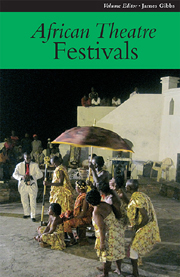Book contents
- Frontmatter
- Contents
- Notes on Contributors
- Obituary of Efo Kodjo Mawugbe
- Introduction by James Gibbs
- Festivals as a Strategy for the Development of Theatre in Zimbabwe 1980–2010
- The Legacy of Festac '77
- Festac, Month by Month & Soyinka's Involvement
- The Dakar Festivals of 1966 & 2010
- African Renaissance between Rhetoric 30 & the Aesthetics of Extravagance FESMAN 2010 – Entrapped in Textuality
- Theatre Programme for FESMAN & Commentary
- The Pan-African Historical Theatre Festival (PANAFEST) in Ghana, 1992–2010
- PANAFEST through the Headlines
- International Festivals & Transnational Theatre Circuits in Egypt, 1988–2010
- The Jos Theatre Festival 2004–2011
- The Grahamstown Festival & the Making of a Dramatist An interview with ANDREW BUCKLAND
- Playscript
- Book Reviews
The Grahamstown Festival & the Making of a Dramatist An interview with ANDREW BUCKLAND
Published online by Cambridge University Press: 05 May 2013
- Frontmatter
- Contents
- Notes on Contributors
- Obituary of Efo Kodjo Mawugbe
- Introduction by James Gibbs
- Festivals as a Strategy for the Development of Theatre in Zimbabwe 1980–2010
- The Legacy of Festac '77
- Festac, Month by Month & Soyinka's Involvement
- The Dakar Festivals of 1966 & 2010
- African Renaissance between Rhetoric 30 & the Aesthetics of Extravagance FESMAN 2010 – Entrapped in Textuality
- Theatre Programme for FESMAN & Commentary
- The Pan-African Historical Theatre Festival (PANAFEST) in Ghana, 1992–2010
- PANAFEST through the Headlines
- International Festivals & Transnational Theatre Circuits in Egypt, 1988–2010
- The Jos Theatre Festival 2004–2011
- The Grahamstown Festival & the Making of a Dramatist An interview with ANDREW BUCKLAND
- Playscript
- Book Reviews
Summary
The following interview with Andrew Buckland was conducted by email in March 2012.
JG:Andrew Buckland, thank you very much for agreeing to be interviewed. Since the early 1980s, you have produced work for the Grahamstown Festival. Could you give some idea what the festival was like in those days and how you approached the prospect of performing at it?
AB: All responses to these questions need to be prefixed by the understanding that I feel unable to comment in any authentic way on how festivals contribute to the evolution of theatre in Africa. I have no real experiential knowledge of what the ‘Grahamstown Festival’, and later the ‘National Arts Festival’ has meant for the majority of theatre makers and artists in this country during the time that it has been running, except through anecdote and conversational discussions with other individual artists.
Growing up in Southern Africa between 1954 and 2012, a white person's experience of the country and the world is seriously tempered by a privileged position. I entered South Africa from Rhodesia in 1973 to escape conscription and, clutching a study permit denied to most citizens of South Africa at the time, I immediately absorbed, because of my colour, privileges and opportunities denied those same majority of citizens of this country.
- Type
- Chapter
- Information
- African Theatre 11: Festivals , pp. 89 - 99Publisher: Boydell & BrewerPrint publication year: 2012



